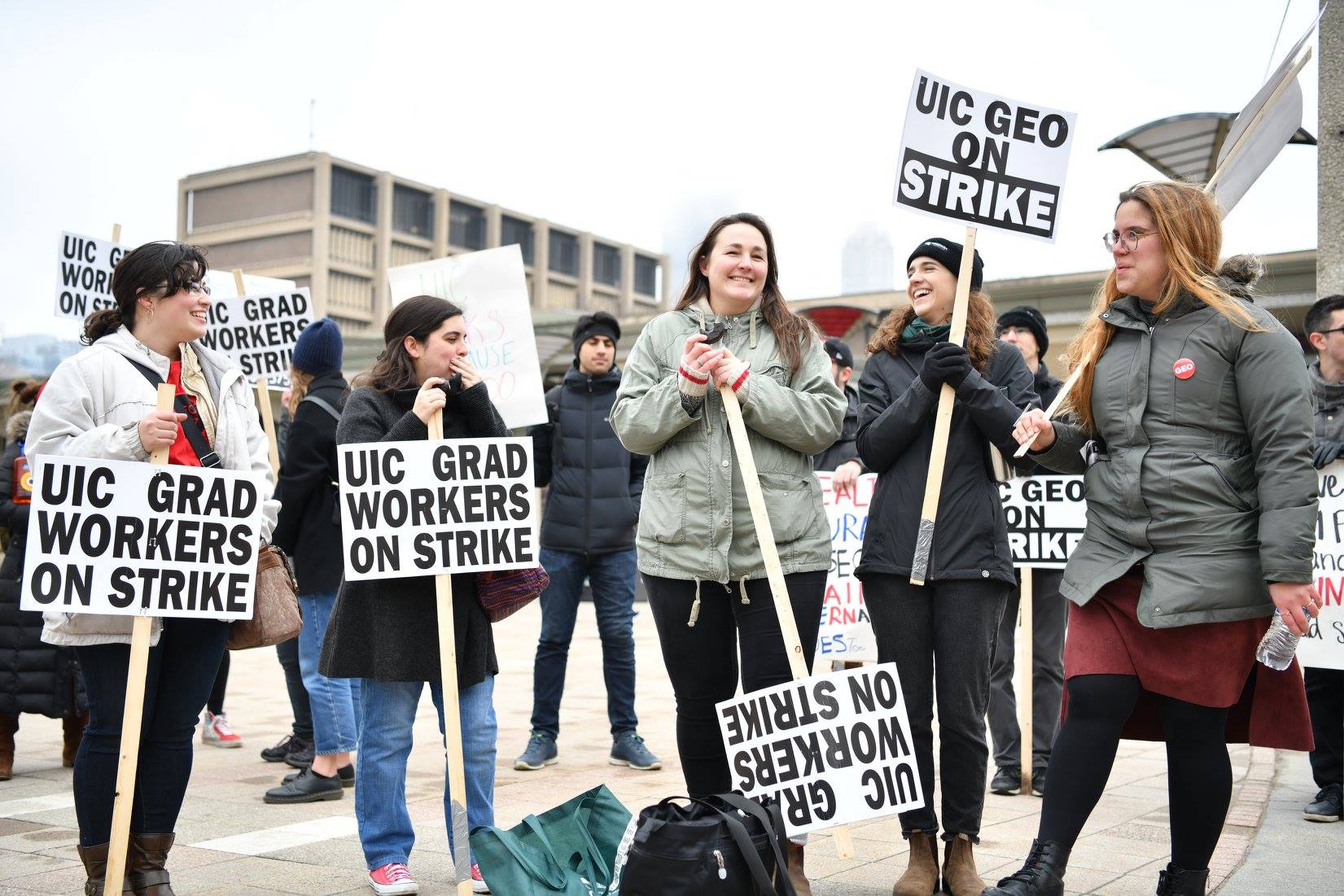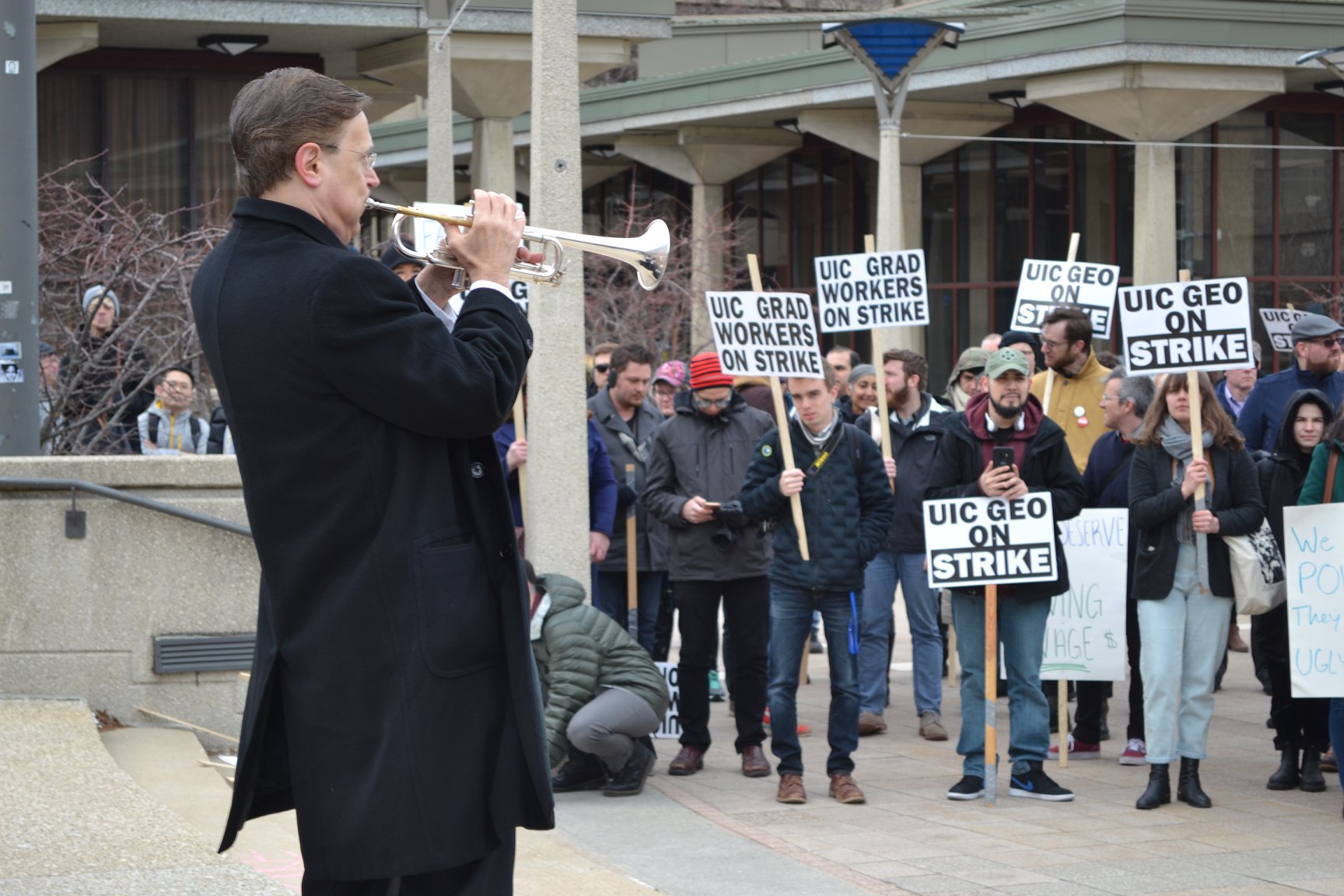By Jeff Schuhrke
As universities increasingly model themselves on corporations and seek to maximize revenues, a growing amount of the teaching workload falls to poorly paid and badly treated graduate student workers. This blatant exploitation is often excused by an academic culture that tells grad workers that we deserve to be miserable– that we chose this life.
During spring semester, 2019, grad workers at the University of Illinois at Chicago (UIC) rejected this narrative and went on strike for nearly three weeks to assert our dignity and affirm the value of our labor. We organized the work stoppage through our union, the Graduate Employees Organization (GEO), an affiliate of the American Federation of Teachers, which represents over 1,500 graduate workers at UIC. GEO became a certified union in 2004 and we won our first contract in 2006.
Why We Went on Strike
Most GEO members at UIC work as teaching assistants or course instructors. We give our students one-on-one attention, do the vast majority of grading, and often serve as the primary instructors for courses of as many as sixty undergrads. Because of the skilled labor we provide as teachers and mentors, student retention and graduation rates are rising, allowing UIC to climb in U.S. News & World Report’s “Best Colleges” rankings.

Despite the value of our work, we were getting paid a minimum salary of $18,000 while being required to pay up to $2,000 back to the university in the form of fees, leaving only $16,000 to live on in a major city. International graduate workers—whose visa status does not allow them to supplement their income with off-campus jobs and who are typically ineligible for financial aid—were required to pay an additional, $260-per-year “international student fee.”
A rapid community health assessment conducted this spring by Radical Public Health, an advocacy organization at UIC’s School of Public Health, found that 77 percent of UIC grad workers cannot afford all their basic living expenses, with 57 percent saying they have had to skip meals due to lack of money for food. Further, a staggering 70 to 80 percent reported experiencing anxiety and depression due in part to living under constant financial stress.
Meanwhile, UIC has been flourishing in recent years. Each year between 2016 and 2018, the university president received a $100,000 bonus to his $600,000 salary. In 2016 and 2017, the chancellor got a $75,000 bonus to his $400,000 salary. Enrollments are at record highs and continuing to grow, and UIC recently acquired the John Marshall Law School.
Using the fees taken from undergraduate and graduate students, UIC has undertaken several multimillion-dollar construction projects, recently building a $100-million academic and residential complex and a $43-million engineering building, with plans for a $95-million performing arts center in the works. Bigger yet, the administration recently announced an ambitious plan to spend $1 billion on campus infrastructure renovations.
For UIC grad workers struggling to get by, seeing top administrators throw huge sums of money at real estate developments while rewarding themselves with exorbitant bonuses was intolerable. With GEO’s old contract expiring and a new round of negotiations beginning in 2018, the union was determined to fight for significant gains.
How We Went on Strike
Negotiations began on March 1, 2018. One of the union’s first priorities was winning fee relief in addition to wage raises. In past contracts, GEO had won raises only to see them clawed back later through fee increases. Further, we sought more transparency and consistency on how departments make appointment and reappointment decisions. Grad workers often do not know whether we will still have a teaching appointment from one semester to the next. When departments are not required to follow any standards on how they make such hiring decisions, they leave the door open to favoritism, discrimination, and retaliation.

GEO activists recognized that our union’s only leverage in negotiations comes from our strength in numbers, and given the university’s anti-union record, we knew there was a decent chance we would ultimately have to go on strike to get the contract we deserved. In order to be prepared to withhold our labor and risk losing pay—an enormous gamble for workers living paycheck to paycheck—we organized a contract campaign in conjunction with the negotiations to build a sense of unity and solidarity among grad workers.
Promoting union democracy and transparency in leadership was a key component of our efforts. As part of the campaign, rank-and-file members were encouraged to attend every bargaining session and pack the room. When administration negotiators would temporarily leave the room so both sides could engage in private caucuses, union members would share their ideas with and pose questions to their fellow members serving on the bargaining team, allowing for an open and democratic process.
The contract campaign also included a series of protest actions. As the administration persistently rejected nearly all of our proposals, dragging the negotiations out for months, these protests became increasingly militant. Our first action was a “work-in,” where GEO members gathered in the lobby of one of the main administrative buildings on campus and did our normal work of grading and advising students. A few weeks later, our union staged an informational picket in front of one of the campus’s main entrances, which had the look and feel of a strike without being one.
By February 2019, with the administration still dismissing our concerns at the bargaining table, GEO members voted overwhelmingly to authorize an indefinite strike, with 99.5 percent voting in favor of striking. The vote was only successful because our members were well informed, involved, and ready to take action.
How We Won
Despite further bargaining sessions following the strike authorization vote, the administration refused to cede ground. The strike began on March 19, 2019. Hundreds of classes were cancelled, and normal operations at UIC were brought to a standstill. It was a genuine work stoppage, not a symbolic protest.
The campus community overwhelmingly supported us. Faculty—whose union was going through a contentious round of contract negotiations of their own—refused to be strikebreakers, despite the administration’s pleas. Undergraduates not only joined us on the picket lines, but also chose not to attend classes when administrators in a couple departments tried teaching in our place.
The administration was unintentionally helpful through the anti-union messages they sent out to the campus community. One such message made the preposterous claim that UIC grad workers make “akin to $62,375,” prompting some GEO members to respond that since they only took home $18,000, UIC owed them $44,000. The administration’s outrageous messaging, which was openly mocked by undergrads on a meme page they created, only helped build support for our strike.
We also had the backing of the wider community. UPS drivers with Teamsters Local 705 honored the picket line by refusing to make deliveries on campus. The Chicago Symphony Orchestra, who also went on strike for seven weeks this spring, joined our pickets with trumpeter John Hagstrom giving a moving solidarity performance. Local and state elected officials also joined our picket lines, and Senator Bernie Sanders tweeted out a message of support.

As the strike neared the three-week mark, the administration could no longer hold out. The chancellor and provost heard from dozens of organizations and constituencies on campus, including department heads and alumni, urging them to reach a fair settlement. For the first time in over a year of negotiations, the provost showed up to a bargaining session, ready to grant concessions. Things the administration had repeatedly told us were impossible suddenly became possible, leading to an agreement that ended the strike on April 5.
What We Won
Because of the successful strike, we won our strongest contract to date. Fees will now be under control. Planned increases will be offset with matching wage increases, future fees will be automatically waived, and the discriminatory “international student fee” will be cut in half. While the administration initially wanted to give us only a seven percent raise over five years, which would not have even kept up with inflation, we instead got a fourteen percent raise over three years—twice as much money in almost half as much time, and our biggest raise ever.
We also won an additional stipulation requiring departments to implement transparent appointment and reappointment guidelines by fall 2020, a necessary step toward eliminating employment precarity.[1] We reduced healthcare costs and got the university to cover a portion of dependent-care coverage for the first time. We also added new nondiscrimination protections around immigration/citizenship status and arrest record, an important victory allowing graduate workers feel more safe and secure in the age of Trump.
Because we refused to accept a five-year or four-year contract that would have only benefited the administration, GEO will get to return to the bargaining table in just two years to fight for more.
Most importantly, GEO members came away from the strike feeling empowered, including international grad student workers, who are traditionally the most hesitant to get involved due to cultural barriers and fears of visa complications. We learned that when grad workers collectively fight for the dignity and respect we deserve, we win.
—
Jeff Schuhrke is Ph.D. candidate in History at the University of Illinois at Chicago, studying the connections between organized labor and international development during the Cold War. He was the co-president of the UIC Graduate Employees Organization, American Federation of Teachers Local 6297, from April 2018 to May 2019. Jeff’s writing has appeared at In These Times, Jacobin, Labor Notes, and Labor: Studies in Working-Class History.
[1] See Page 33 on the newest contract.
Featured Image: UIC-GEO on Strike. Photo by Jānis Lazovskis


Pingback: More Bargaining and No Work: UIC GAs and TAs Strike After a Year of Contract Bargaining – Fourteen East
Pingback: Supporting Graduate Student Working Conditions Is A Matter Of Educational Equity: A Letter To The UIC Community -